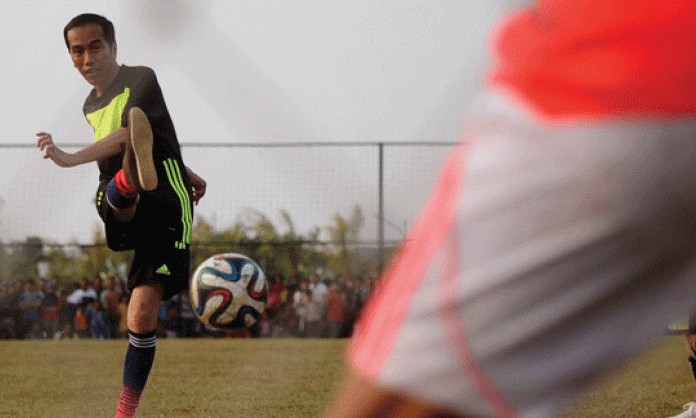The Indonesian Constitutional Court has rejected all components of a legal challenge by Prabowo Subianto to the July presidential election results.
The Electoral Commission declared Joko Widodo winner, 53 percent to 47 percent. The margin was just over 8 million votes out of around 120 million, with 55 million abstentions. The Constitutional Court’s decision ends the legal challenges.
The political atmosphere in Indonesia, especially Jakarta, is now pregnant with expectations and questions. There are two foci for these. The first is related to the kind of cabinet Widodo will form and his first policy initiatives. The second is related to whether the coalition of five parties that supports Prabowo will remain intact. This coalition controls 63 percent of the parliamentary seats. The Indonesian political system is semi-presidential semi-parliamentary, in which the parliament retains significant power.
Widodo is a member of and was nominated as a presidential candidate by the Indonesian Democratic Party of Struggle (PDIP), headed by Megawati Sukarnoputri. His nomination was also supported by the Nasional Demokrat (Nasdem) party, headed by billionaire media tycoon Surya Paloh, and by the National Awakening Party (PKB).
Different influences
However, Widodo has never been an integrated member of the PDIP and has attracted support from outside these parties, especially from the technocrat intelligentsia and the NGO development technocracy, comprising former activists. There are various strands of thinking in this milieu.
There are also business associates and colleagues of Widodo who have been involved in his political rise. As a consequence of his relative non-integration with any single political bloc, there is still a lack of clarity about the balance within his government – although it should be noted that none question Indonesia’s general capitalist economic policy framework.
Widodo has appointed a transition team that will advise on preparing for government. This has given hints of the power balance. Team head Rini Suwandi was a former minister in the Megawati government of 2001-04 and is intimately connected to one of the biggest conglomerate groups in Indonesia, the automobile assembly giant Astra. She also heads her own large company.
A second controversial appointment was former lieutenant general Hendropriyono, a close confidant of Megawati. Hendropriyono is accused by human rights organisations of being responsible for massacres of peasants in Sumatra in the New Order period and of being involved, or accountable, for the murder of human rights activist Munir, when head of the Indonesian intelligence service under Megawati. Widodo defended this appointment, saying that the accusations were unproven.
A third appointment was former general Luhut Panjaitan, a business associate of Widodo.
Supporters of Widodo from the technocrat-intelligentsia milieu, however, also claim that Widodo is drawing on their expertise. This milieu was associated with a range of non-party campaign volunteer groups – in Indonesian, relawan – that were active in supporting Widodo, especially on social media. Widodo has called on the relawan to continue to act as a channel of information from the grass roots to the presidency.
Which will be most influential, within the pro-capitalist policy framework of the government – the PDIP, Nasdem and PKB political elites, the big business groups associating with Widodo or the technocratic intelligentsia? This is what observers and participants alike are asking.
Widodo also has recently claimed that he has entered discussions with two parties in the Prabowo coalition: the National Mandate Party and Yudhoyono’s Democrats. These are the two parties closest in terms of economic ideology to Widodo and his vice president Yusuf Kalla. There have been no statements from those two parties confirming discussions.
Policy issues mentioned as possible indicators are whether the new government will further reduce fuel subsidies and thus increases prices and push up inflation (and thereby gain some tax revenues) and whether it will open the property market to foreign investment.
Opposition coalition
The initial commentary from most of the pro-Jokowi (as Widodo is known) media after the 9 July election predicted that the coalition of six parties that supported Subianto would quickly collapse after his defeat.
These parties include Subianto’s own party, Gerindra; the old Suhartoist Party Golkar, headed by Indonesia’s richest tycoon Aburizal Bakrie; the Democrat Party, headed by incumbent president Yudhoyono; and three conservative Islamic parties – the National Mandate Party, the United Development Party and the Justice and Welfare Party.
The chairperson of the National Mandate Party, Hatta Rajasa, was Subianto’s vice presidential running mate. Rajasa also was Yudhoyono’s chief economic policy minister for the last four years and is also his son-in-law.
To date, all these parties have remained solid as a coalition. They have announced that they will use their numbers in the new parliament, to be sworn in on 1 October, to obtain all the key parliamentary positions. They have indicated they will vote to form a commission to investigate the conduct of the presidential elections. There are some indications that they could also boycott the swearing in of Widodo and Kalla in late October.
However, it is not impossible that once they have flexed their muscle in parliament, some of them may be open to doing deals with the Widodo-PDIP-Nasdem-PKB coalition.
In the few weeks since the election, the several small socialist groups in Indonesia have been relatively quiet, judging from their websites. The most visibly active are those that have aligned with the technocratic-intelligentsia milieu who are backing Jokowi. They have been holding seminars and forums to discuss how they can “escort” Widodo down the right path – seemingly of a human rights and welfare state oriented capitalism. It is likely that other Left groups will start to clarify their positions once the various forces in elite politics further clarify their stands.
------------
Dr Max Lane is a lecturer in politics at Victoria University, Melbourne and regularly visits Indonesia.










